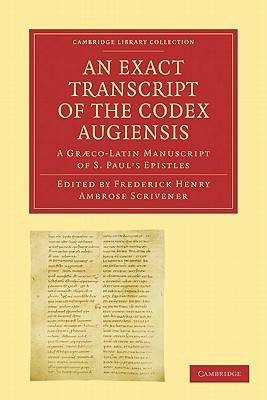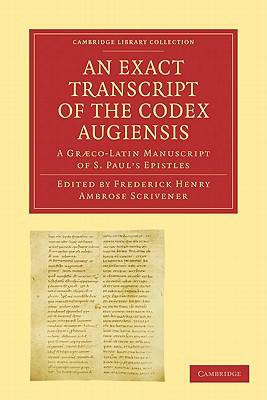
- Afhalen na 1 uur in een winkel met voorraad
- Gratis thuislevering in België vanaf € 30
- Ruim aanbod met 7 miljoen producten
- Afhalen na 1 uur in een winkel met voorraad
- Gratis thuislevering in België vanaf € 30
- Ruim aanbod met 7 miljoen producten
Zoeken
An Exact Transcript of the Codex Augiensis
A Graeco-Latin Manuscript of S. Paul's Epistles, Deposited in the Library of Trinity College, Cambridge;
€ 57,45
+ 114 punten
Omschrijving
Frederick Henry Scrivener (1813-1891) was a pioneer of New Testament textual criticism. His transcription of the Codex Augiensis - a ninth-century Greek and Latin manuscript of St Paul's Epistles which had been part of the famous Benedictine library at Reichenau - was published in 1859 and is a document of considerable historical significance in biblical research. It presents 'as true an image as possible' of the ninth-century text. The volume also includes a 'full and exact' collation of fifty manuscripts of the Gospels. In his Critical Introduction, Scrivener provides a detailed account of the manuscripts he has collated, setting the context for the reader. He also investigates the principles of comparative criticism, demonstrating that true and faithful readings of the Greek New Testament cannot be derived from any one authority, but must be the result of patient comparison of the evidence provided by all.
Specificaties
Betrokkenen
- Uitgeverij:
Inhoud
- Aantal bladzijden:
- 668
- Taal:
- Engels
- Reeks:
Eigenschappen
- Productcode (EAN):
- 9781108007498
- Verschijningsdatum:
- 25/02/2010
- Uitvoering:
- Paperback
- Formaat:
- Trade paperback (VS)
- Afmetingen:
- 152 mm x 229 mm
- Gewicht:
- 966 g

Alleen bij Standaard Boekhandel
+ 114 punten op je klantenkaart van Standaard Boekhandel
Beoordelingen
We publiceren alleen reviews die voldoen aan de voorwaarden voor reviews. Bekijk onze voorwaarden voor reviews.







